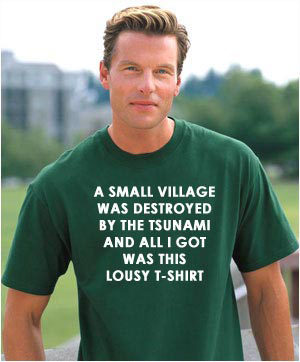The Tsunami, The Better

I really wish everyone would just stop talking about tsunami (or as my prof calls it, “the SOO-nameee.”) Everywhere I turn is another sob story about some Belgian woman who lost her favorite pair of Birkenstocks or a listing about an upcoming benefit concert with Nancy Sinatra and Sandra Bernhard (no lie – at Crobar last Thursday).
Now, perhaps I should backtrack, lest you think I’m some sort of heartless bastard (there’ll be enough confirmation of that later). When the tsunami hit on December 28, I was in the grips of a flu so crippling I thought it might be scarlet fever. We’re talking 100 degree temperature, dizziness, vomiting – even the occasional hallucination. I had little contact with the outside world for almost a week, and hadn’t heard anything about the devastation in Indonesia. I do recall a feverish trip to the bodega and seeing the front page of the Post with pictures of some building with its façade caved in, but I think I just assumed it was somewhere in Fallujah.
In fact, my first brush with the tsunami wasn't until New Year’s Eve day, when I was making a stop at my second-favorite comic book shop, Jim Hanley’s Universe on 34th between Fifth and Sixth Aves. As I brought my issue of Teen Titans up to the register, I noticed a little tin can with the words “FOR TSUNAMI” on it. Still woozy from my recent illness, I assumed Tsunami was some independent comic book company that was on the verge of bankruptcy. Needless to say, I didn’t contribute.
Finally when I got home and turned on the TV, I learned what all the hubbub was about. Apparently, there was a giant tidal wave that wrecked havoc with Sri Lanka, Phuket and other Indonesian countries. Of course, based on the news coverage I was watching – and later reading in popular magazines – I could’ve very easily been under the impression that the tsunami happened in Interlocken, Switzerland (And, no, not because my geography skills are the product of the American education system). All the faces that I saw when the news covered the tragedy were white and upper/middle class. ABC News studiously reported on the health of Czech supermodel Petra Nemcova (who apparently lost a false eyelash), while People, Fox News and other fourth estate stalwarts picked apart the various tragedies suffered by lilywhite European tourists. Um, what about the millions of Asians who lost their homes, jobs or even their lives? You could almost see the network news honchos in their board rooms, talking about how white faces are more "relatable" to their audiences.
One of the most exploitative – and widely circulated – stories I heard was about Australian vacationer Jillian Searle who was desperately trying to hold onto her two young children as the waves pounded their bodies savagely. Forced into a veritable "Sophie's Choice," Searle let go of her elder son in order to save his younger brother. I wondered how that story reached newsmakers? Did Searle hold a press conference? Did Dan Rather track her down as she lay weeping by the shoreline? The irony was that the older son, Lachlan, was eventually rescued – meaning he now gets to grow up knowing his mother chose not to save him. Happy birthday, kid!
(And let's not concern ourselves with the thousands of Indonesian orphans the tidal wave left behind – we've got a great shot of this little tow-headed toddler safely playing in his backyard!)
Yes, the tsunami was devastating, and telling people's stories can help the healing process. But this sort of extreme "human interest" borders on the obscene. Why didn’t we get this glut of heart-tugging stories after the earthquake in Armenia or any number of other natural disasters?
I think it all boils down to September 11. When the Twin Towers fell, the usually Machiavellian media was caught off-guard. As journalist Bernard Goldberg wrote, "America's royalty, the TV news anchors, got it right. They gave us the news straight, which they don't always do. They told us what was going on without the cynicism and without the attitude." But in our post-9/11 world, the media has sped up its learning curve. When the tsunami came, news producers were ready to package it into nice and neat soundbites, delivered by reassuring white faces – not by those inscrutable Asians. Yes, I know the language barrier was an factor, but given how many tourists descend on that region every year, I have to believe at least a sizeable portion of the natives speak English.
As the "breaking news" aspect of the tsunami faded and the reporters went home, the PR industry swept in like the cavalry to rescue us from focusing on real life. Every celebrity from Madonna to Baby Spice is "pitching in" to help raise money and/or awareness. (I know this because publicists from around the world are busy faxing releases telling me so.) I'm all for charity, but you can hear the gears of the publicity machine behind these courageous acts of altruism churning a mile away. How long before we can buy a Lance Armstrong-like bracelet (the new AIDS ribbon, by the way) to commemorate the tragedy?
Oh wait, somebody already made them.

